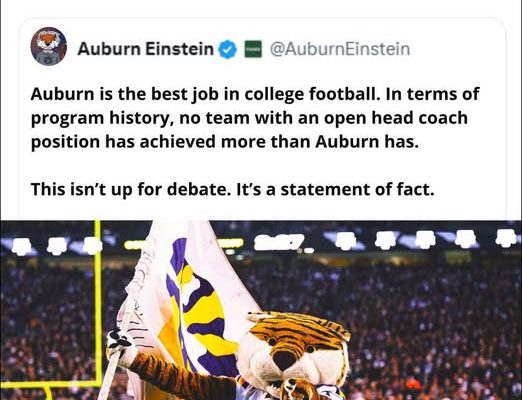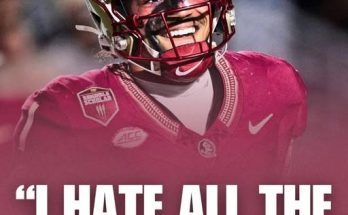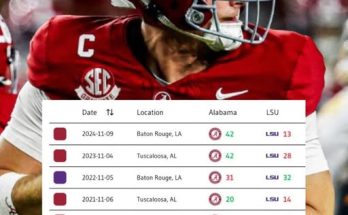Auburn fans have long prided themselves on tradition, passion, and the belief that their football program stands shoulder to shoulder with the best in college football. They sing about family, unity, and heart. They invoke phrases like “It just means more” and claim that Auburn’s story is one of perseverance, loyalty, and greatness. But behind the orange-and-blue pride lies an unspoken truth: Auburn’s fans often celebrate titles that never truly existed, while schools like LSU—just a few hours away—actually have the hardware, the banners, and the history to back it up.
College football thrives on nostalgia and mythology. Every fan base tells its own story, and Auburn’s is filled with “what ifs” and “should have beens.” Ask a die-hard Tiger fan from The Plains about their program’s success, and you’ll hear about the 1913 team, the 1957 championship, and of course, the undefeated seasons that somehow went unrecognized by the national selectors. They’ll point to the 2004 campaign—when Tommy Tuberville’s squad went 13-0, beat multiple top-10 teams, and still got shut out of the BCS title game—as proof that Auburn has been wronged by the system, time and time again.
And yet, while Auburn continues to romanticize those seasons and inflate their unofficial trophy case, LSU doesn’t need to. The Bayou Bengals don’t argue about what might have been—they point to what was. LSU’s dominance isn’t theoretical. It’s real, it’s measurable, and it’s carved into college football history in gold letters. From Nick Saban’s foundation-building in the early 2000s to Les Miles’ quirky, grass-eating brilliance in 2007, and finally to Ed Orgeron’s once-in-a-generation 2019 team that may go down as the best ever assembled—LSU wins when it counts, and the record books prove it.
Auburn fans, meanwhile, love to inflate their accomplishments with phrases like “claimed national titles” or “recognized by some poll.” In the early 20th century, when multiple selectors and organizations awarded national championships, Auburn—like many others—decided to retroactively “claim” a few. The 1913 team, for instance, is one Auburn fans proudly cite, even though the NCAA’s official record book doesn’t recognize them as national champions. The same goes for 1983, when Auburn finished 11-1 but didn’t receive the AP or Coaches’ title. The program later “claimed” it decades afterward. It’s an exercise in rewriting history, one that gives Auburn fans a way to feel equal footing with their SEC neighbors, even if the facts don’t quite line up.
LSU doesn’t need to play that game. The Tigers have official, undisputed championships in 1958, 2003, 2007, and 2019—each one earned on the field, against the best of the best. There’s no asterisk, no retroactive claim, no debate. When LSU wins, the whole nation recognizes it. The confetti falls, the trophies shine, and the rings sparkle with legitimacy.
It’s this contrast that fuels one of the quietest but most entertaining rivalries in the SEC. LSU and Auburn don’t share the same level of hatred as Auburn and Alabama or LSU and Ole Miss, but the tension runs deep. Auburn’s fans see themselves as equal to LSU in football stature, but reality tells another story. When it comes to championships, LSU has proven itself time and again as a program built on results, not revisionism.
Even in recruiting battles and national perception, the divide is evident. LSU consistently produces NFL talent at a staggering rate—wide receivers, defensive backs, linebackers, linemen, and of course, quarterbacks. The program’s ability to reload, not rebuild, is what keeps it at the top of the SEC and in the national spotlight. Auburn, meanwhile, has struggled to sustain success beyond a few magical seasons.
The 2010 season, led by Cam Newton, is often cited by Auburn fans as proof of their elite status. And yes, Newton’s dominance that year was historic—an undeniable, unforgettable ride that delivered Auburn’s lone undisputed modern championship. But that was 15 years ago. Since then, Auburn has been a rollercoaster: brief peaks of excitement, followed by valleys of disappointment, coaching changes, and internal chaos. LSU, even in its down years, never drifts far from national relevance.
What makes Auburn’s delusion more interesting is how it feeds into their fan culture. Auburn fans love to tell you how “different” their family is, how “special” the Auburn experience feels, and how “the rest of the world just doesn’t understand.” It’s a narrative built on emotional investment and shared struggle, but it often masks the fact that their success simply doesn’t match their self-perception. They chant “War Eagle” and talk about loyalty while their rivals—Alabama and LSU—stack up titles and trophies that Auburn can only dream about.
LSU fans, on the other hand, don’t have to explain their greatness. It’s visible. It’s tangible. Baton Rouge doesn’t need nostalgia to feel powerful—it lives in the present. From Tiger Stadium’s electric Saturday nights to the endless stream of NFL draft picks, LSU’s dominance is baked into the modern fabric of college football. When LSU fans brag, they’re not reaching into the past—they’re speaking from the now.
Perhaps what bothers Auburn fans the most is how LSU has managed to outshine them in almost every measurable way. Once upon a time, Auburn could make the case that their program was roughly on par with LSU’s. But since the 2000s, that gap has grown into a canyon. LSU’s investment in facilities, recruiting, and coaching has paid off in sustained success. Even when the Tigers stumble, they recover quickly. Auburn, on the other hand, has become a program perpetually chasing stability.
The irony is that Auburn’s obsession with unclaimed glory only makes LSU’s accomplishments stand out more. LSU doesn’t need to dig into the archives or claim titles from long-forgotten polls—they simply point to national title celebrations that actually happened. The images of Joe Burrow smoking a cigar in the Superdome, of Nick Saban holding up the BCS crystal, or of Les Miles being showered in Gatorade after upsetting Ohio State—those are real moments etched into college football history.
Meanwhile, Auburn fans cling to narratives about 1913 or 1983, as if claiming those championships somehow bridges the gap. It’s almost endearing, in a way—like watching someone talk themselves into believing their favorite band was more influential than The Beatles. Auburn’s pride is admirable, but it often drifts into fantasy.
The difference between LSU and Auburn also lies in culture. LSU’s football identity is built on swagger—an unapologetic confidence that radiates from Baton Rouge and extends nationwide. LSU players carry that swagger into the NFL, becoming stars who embody that same intensity and flair. Auburn’s culture, while passionate, often feels defensive. They constantly seek validation—whether by claiming national titles that weren’t awarded, or by reminding everyone that “we beat Alabama that one year.”
That’s the heart of the issue. Auburn defines itself through others—always comparing, always justifying. LSU defines itself through results. When LSU wins, it’s because it’s earned. There’s no need to rewrite history books or rely on the opinions of obscure retroactive polls.
And perhaps that’s why LSU fans rarely feel the need to respond when Auburn fans boast about their “claimed” titles. They don’t have to. The scoreboard of history already tells the story. LSU’s trophy case gleams with legitimacy. Auburn’s, while proud, is filled with question marks.



